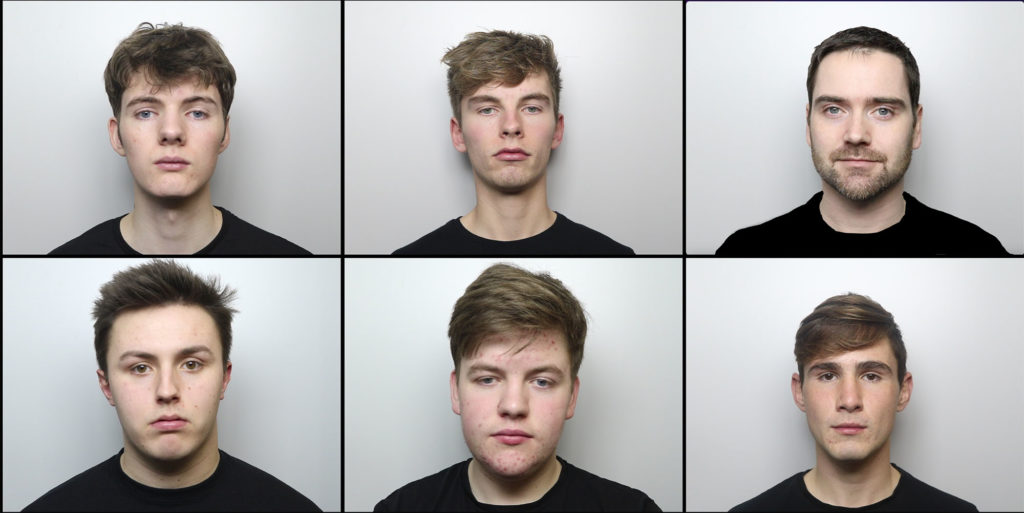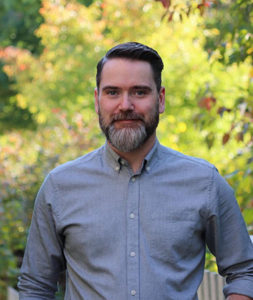First Person
Careers Up Close: Ryan Fitzgerald Eyes Eyewitness Identification

Image above: Ryan Fitzgerald and five other individuals from Fitzgerald’s Eyewitness Lineup Identification image database.
Ryan Fitzgerald is an associate professor of psychology at Simon Fraser University. His research focuses on psychology and law, eyewitness identification and performance, and facial recognition.
Current role: Associate Professor of psychology, Simon Fraser University, 2023–present
Previously: Assistant Professor of psychology, Simon Fraser University, 2019–2023
Terminal degree: PhD in experimental and applied psychology, University of Regina, 2015
Recognized as an APS Rising Star in 2019
Eyeing eyewitness identification • Mentoring with autonomy in mind • A challenging but rewarding path • Lessons learned
Looking into lineups
For most of my research career, I have studied how eyewitnesses make decisions from police lineups. I initially focused on how the similarity of the lineup members affected lineup fairness and eyewitness performance. I am somewhat embarrassed to admit that after 10+ years I still haven’t quite cracked this one, but I’m still working on it.

I also have taken some detours into other topics. For instance, one of my PhD advisors studied the development of memory in children, and we did a few studies together on age differences in eyewitness identification. I have also developed an interest in international variations in eyewitness identification procedures, which was influenced by my exposure to the unique system of eyewitness identification in England, where (rather than the typical use of photo lineups in North America) the police have amassed large databases of video recorded images of people to use for video lineups. My research program has also expanded into new topics such as identification of wanted fugitives and identification of people caught on camera committing crimes, which are topics that are now on my radar thanks to the graduate students in my lab.
We have been studying eyewitness identification from lineups for over 50 years, and although there is still much work to do, there are many other aspects of criminal investigations that need to be studied. If you live in a city, there are security cameras all over the place. We also have cameras in our pockets now. This has led to a rise in the use of video evidence in criminal cases. Identifying someone on video is still not as easy as it sounds though, and figuring out how to do this reliably is something I will be focusing on in the future.
Mentoring with autonomy in mind
I currently have four graduate students in my lab. I think it’s important to help your mentees find a project that they will be intrinsically motivated to work on for the next 2 or 3 years. I had great mentors when I was in grad school, and my approach to advising is largely just trying to emulate what my advisors did for me. They gave me the freedom to carve my own path and study a topic that did not fit squarely into their existing research programs. This gave me a sense of autonomy, and without that I don’t think I would have been so motivated to put in those long hours that were needed to be successful in graduate studies.
It’s kind of like Alison Gopnik’s metaphor for parenting: if you want your students to succeed, you can be the carpenter who actively shapes them into your vision of success by micromanaging their every decision, or you can be the gardener who provides the environment that allows them to chart their own path and achieve their own vision of success. Though I trust it does not always seem this way to the students, I try to be the gardener.
Read Presidential Columns featured in the Observer by APS Past President Alison Gopnik
I like many things about my work. I enjoy running a lab and advising graduate students. I like that my work will never be boring, and there will always be new challenges to address. I also absolutely love the experience of giving a talk or a lecture that engages the audience. If I were to settle on the one thing that I enjoy the most, I’d say it’s the moment of discovering something new about the world. Nothing beats that feeling of testing a hypothesis on a new data set, particularly if the project has been many years in the making.
A challenging but rewarding path
My biggest challenge was getting into graduate school. During my final year of undergrad studies, I applied to eight grad schools and was accepted by zero. During the time I was writing my personal statements for those applications, I was distracted by some pretty stressful (non-academic) stuff that was happening in my life. At least that’s what I keep telling myself when I think back to what went wrong. I even nearly failed two classes that term (scoring a measly 50% in each). Although I wasn’t especially surprised when I got all those rejection letters, it was dispiriting. I was planning to apply again the following year until I finally received some good news: I got a letter saying that my application to Canada’s national funding institute, the Social Sciences and Humanities Research Council, was successful.
Ultimately, this opened my door to the graduate program at the University of Regina in Saskatchewan. I actually hadn’t even applied to Regina because it’s where I had completed my undergraduate degree, and I had always been told that you need to do your graduate training at a different institution. In fact, at the first meeting with my new graduate advisors, I brought this up and they assured me that although having exposure to different institutions has its advantages, being productive and doing good science was more important than where you earned your degree—which was highly motivating. I assumed that when I would be applying for jobs, having all my degrees at the same institution would not look good, so I convinced myself that if I wanted to make a career out of this, I needed to work harder than everyone else. So that’s what I tried to do. And when it came time to apply for jobs, it paid off. On my first application for a faculty position, I got the job.
I started out as a faculty member in psychology at University of Portsmouth, and it was lovely. Portsmouth is home to the International Centre for Research in Forensic Psychology, and this meant I had several colleagues with similar research interests. We went out to the pub together on Fridays, usually followed by a late-night curry. We attended conferences together. It was a fun time in my life. Being located in southern England, with such a high concentration of nearby universities, was also advantageous. The department could bring in external speakers every week for seminars, and I was also regularly visiting colleagues and giving seminars to their departments. It was the perfect place to expand my network.
I was happy in Portsmouth, and I was always open to the possibility of staying put, but after being there for a few years I decided it would be worth checking in with my wife about whether Portsmouth was where we wanted to stay. She indulged me in an exercise of imagining ourselves anywhere else in the world. We literally could only think of three other places that might work for us. This exercise validated how lucky we felt to be in Portsmouth, but it also increased the temptation to apply when a job was posted a few months later at one of those three institutions: Simon Fraser University. In addition to its excellent psychology and law program, Simon Fraser University is located in the Vancouver area of Canada. It was where I had always dreamed of ending up, and it is a privilege to live in such a beautiful part of the world.
Lessons learned
For those early-career researchers who are interested in getting involved in this field, I would advise them to not be afraid of knocking on some doors. When I started out, I didn’t know any of the big names in my field, and I didn’t think I ever would get to know them. I did, however, eventually muster up the courage to reach out to many of them. To my surprise, they invariably responded with kindness and support. I was also doubtful that I would ever find a partner in law enforcement because I had heard that practitioners in the criminal justice system were not interested in getting involved in psychological research.
Read all of the articles from the November/December Observer.
In my experience of reaching out to people in the criminal justice system, I have come to believe this is true for a lot of them. Most are not interested. I knocked on a lot of doors, though, and it turns out that some practitioners are very keen to get involved. I now have contacts in law enforcement who have been invaluable partners in informing my research and translating the science into practice. So, my advice is to not be shy. If you want someone on your team, reach out to them. Some might say no, but if you can live with a little bit of rejection, which is essential for a career in psychology, you will also get some who say yes.
Feedback on this article? Email [email protected] or login to comment. Interested in writing for us? Read our contributor guidelines.





APS regularly opens certain online articles for discussion on our website. Effective February 2021, you must be a logged-in APS member to post comments. By posting a comment, you agree to our Community Guidelines and the display of your profile information, including your name and affiliation. Any opinions, findings, conclusions, or recommendations present in article comments are those of the writers and do not necessarily reflect the views of APS or the article’s author. For more information, please see our Community Guidelines.
Please login with your APS account to comment.